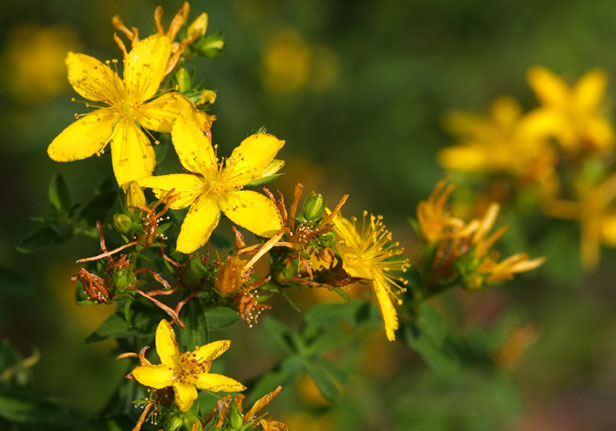Often referred to as the sunshine herb, this common bushy perennial plant with its bright yellow flowers is considered to be one of the key plants for treating depression. Its botanical name ‘Hypericum’ comes from the ancient Greek meaning ‘ great health’. Its popularity in Ancient Greece and Rome gave rise to its use as a wound healer, among many other things. In the Middle Ages a sprig of St John’s wort was worn to ward off ghosts, evil spirits, insanity, and even bad weather!
RESEARCH
Over the last 20 years, there have been extensive studies and clinical trials carried out on St John’s wort, especially in Germany. It is thought that the active constituent ‘hypericin’ is responsible for many of the plant’s actions. It also contains a number of other important constituents, namely hyperforin, tannins and flavonoids.
At least 30 studies on more than 1,700 patients show that St John’s wort can be an effective remedy for mild-to- moderate depression without the side effects of more conventional anti-depressants. It also works well in cases of long-term stress and worry, helping to relax and strengthen an exhausted nervous system.
It is often prescribed to help banish seasonal affective disorder (SAD), a severe form of the winter blues thought to be bought on by the lack of sunlight that occurs in winter. In one study comparing St John’s wort to light therapy, the researchers concluded that St John’s wort was just as effective. However, depression isn’t the only problem that St John’s wort can help – it has also been shown to benefit several other problems. The benefits of St Johns wort, however, aren’t immediate and it can take between three and six weeks for the full effects to be felt.
USES
INSOMNIA
St John’s wort has also been shown to help increase the production of the hormone melatonin (the brain’s natural sedative) to help improve quantity and quality of sleep.
BACTERIAL INFECTIONS
the presence of hyperforin, a constituent discovered by Russian scientists, have demonstrated considerable antibacterial action. A 1999 study in The Lancet indicated that hyperforin may be active against MRSA.
SKIN
St John’s wort can be used as a cream for a number of skin problems as an aid to healing and for its antibacterial and antiviral actions.
VIRUSES
St John’s wort has been shown to have antiviral action owing to the presence of hyperforin. It may be used to treat the herpes virus.
ALCOHOLISM
A study published by the European Neuropsychopharmacology Journal demonstrated that St John’s wort helped to control alcohol cravings in people suffering from alcoholism. There are reports that taking it may also help those wishing to quit smoking.
STRESS DISORDERS
St John’s wort may be useful in treating disorders that are aggravated by stress. When combined with other herbs such as camomile and rhodiola it can an effective treatment for anxiety.
WATCHPOINTS
- St John’s wort should be avoided in pregnancy and breastfeeding and by those already taking antidepressant medications.
- St John’s wort reduces the effectiveness of oral contraceptives and it may interact with other medicines, such as sedatives, tranquillisers and anaesthetic medications. If you are on any medications, always consult your GP or medical herbalist.
- If you are having surgery it is important to let your anesthetist know if you are taking or have recently taken St John’s wort.
- Side effects are rare but some people have reported mild gastrointestinal effects.
- St John’s wort may increase sensitivity to sunlight so make sure you use a sun protective cream even if your skin is resilient to the effects of the sun.























